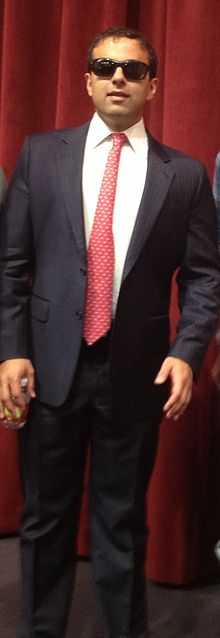Cyrus Habib
| Cyrus Habib | |
|---|---|
 | |
| Member of the Washington House of Representatives from the 48th district | |
| Incumbent | |
| Assumed office January 14, 2013 | |
| Preceded by | Deborah Eddy |
| Personal details | |
| Born | August 22, 1981 Baltimore, Maryland, U.S. |
| Political party | Democratic |
| Residence | Kirkland, Washington |
| Alma mater | Columbia University Oxford University Yale Law School |
| Profession | Attorney and Professor |
| Religion | Roman Catholic |
Cyrus Habib, born August 22, 1981, is an attorney, law professor, and politician from the U.S. state of Washington.
In 2012, Habib, a Democrat, was elected with over 61% of the vote to represent Washington's 48th Legislative District, which includes Bellevue, Clyde Hill, Hunts Point, Kirkland, Medina, Redmond, and Yarrow Point, in the Washington State House of Representatives.[1] Raising over $340,000, Habib set a record for the most money ever raised for a State House campaign in Washington State.[2] Soon after his election, Habib was selected by his peers to serve as Vice Chair of the House Committee on Technology and Economic Development.[3] He also practices law at Perkins Coie in Seattle, where he primarily advises technology startups.[4]
He is a Rhodes Scholar, a Truman Scholar, and a graduate of Columbia University (Summa Cum Laude and Phi Beta Kappa), Oxford University, and Yale Law School (where he served as Editor of the Yale Law Journal and was mentored and influenced by Judge Guido Calabresi and Professors Akhil Amar and Harold Koh). [citation needed] He has been fully blind since age 8. Born in Maryland to parents who had emigrated from Iran, Habib is the first Iranian-American elected to state office in the United States, and is the highest ranking Iranian-American in political office.[5] Habib was named one of "12 State Legislators to Watch in 2014" by Governing.com.[6]
In 2013, Habib was named Distinguished Lawmaker in Residence at the Seattle University School of Law, where he teaches upper level courses and researches issues related to the convergence of technology and public policy.
References
- ↑ "Habib draws on life experience to serve 48th district - Bellevue Reporter"
- ↑ "Washington State Public Disclosure Commission"
- ↑ "House committees, chairs approved "
- ↑ "Perkins Coie Biography"
- ↑ "Candidate Makes History, Becoming First Iranian American Elected to a State Legislature"
- ↑ Jacobson, Louis (January 2014). "12 State Legislators to Watch in 2014". Governing.com. Retrieved 25 December 2013.